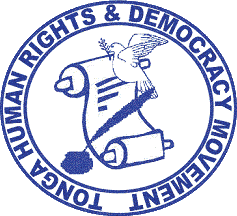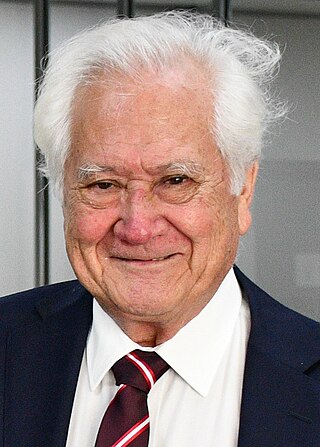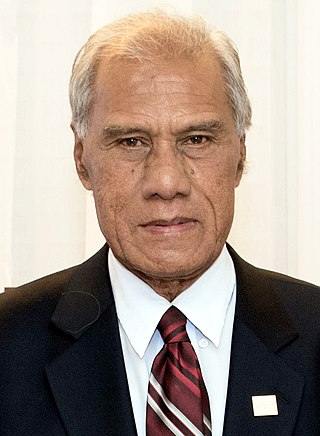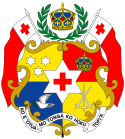
The history of Tonga is recorded since the ninth century BC, when seafarers associated with the Lapita diaspora first settled the islands which now make up the Kingdom of Tonga. Along with Fiji and Samoa, the area served as a gateway into the rest of the Pacific region known as Polynesia. Ancient Tongan mythologies recorded by early European explorers report the islands of 'Ata and Tongatapu as the first islands having been hauled to the surface from the deep ocean by Maui.

The politics of Tonga take place in a framework of a constitutional monarchy, whereby the King is the Head of State and the Commander-in-Chief of the Armed Forces. Tonga's Prime Minister is currently appointed by the King from among the members of Parliament after having won the support of a majority of its members. Executive power is vested in the Cabinet of Ministers. Legislative power is vested in the King in Parliament, and judicial power is vested in the supreme court.

The Human Rights and Democracy Movement (HRDM) is a political party in Tonga. Its leader is Uliti Uata. It states its ideology to be democracy, social justice, opposition to corruption, and women's rights.

Feleti Vakaʻuta Sevele, Lord Sevele of Vailahi is a Tongan politician who served as the prime minister of Tonga from 30 March 2006 to 22 December 2010.

The Legislative Assembly of Tonga is the unicameral legislature of Tonga.

Te Tai Tonga is a New Zealand parliamentary Māori electorate, returning one Member of Parliament to the New Zealand House of Representatives. It was established for the 1996 general election, replacing Southern Maori. It covers all of the South Island, Stewart Island, the Chatham Islands, and parts of both Wellington City and the Hutt Valley. The current MP for Te Tai Tonga is Tākuta Ferris of Te Pāti Māori.

General elections were held in Tonga on 23 and 24 April 2008 to elect members of the Legislative Assembly. The nobles were elected on 23 April, and the nine people's representatives on 24 April. A total of 32,000 people turned out to vote, giving a turnout of 48%.

The Constitution of Tonga is supreme law under which the Government of Tonga operates. It was enacted by King George Tupou I on 4 November 1875. It stipulates the makeup of the Tongan Government and the balance between its executive, legislature, and judiciary. The anniversary of its passage is celebrated annually as Tonga's Constitution Day.

Samiuela ʻAkilisi Pōhiva was a Tongan pro-democracy activist and politician. A key leader of the Democratic Party of the Friendly Islands (DPFI), he served as the Prime Minister of Tonga from 2014 to his death in 2019. He was only the fourth commoner to serve as Prime Minister, and the first commoner to be elected to that position by Parliament rather than appointed by the King.

Early general elections under a new electoral law were held in Tonga on 25 November 2010. They determined the composition of the 2010 Tongan Legislative Assembly.

Siale ʻAtaongo Kaho, Lord Tuʻivakanō is a Tongan politician who served as the prime minister of Tonga from 2010 to 2014.

Dr. Viliami Uasike Latu is a Tongan politician and Cabinet Minister.
This national electoral calendar for the year 2002 lists the national/federal direct elections to be held in 2002 in the de jure and de facto sovereign states. By-elections are excluded, though national referendums are included.

Moʻale Finau is a Tongan politician and Member of the Legislative Assembly of Tonga.

Fatafehi Fakafānua, known before ascending to his title as Fatafehi Kinikinilau Lolomana‘ia Fakafānua, is a Tongan politician, Lord of the Realm and the Speaker of the Tongan Legislative Assembly. He is the 8th Lord Fakafānua.
ʻEua 11 is an electoral constituency for the Legislative Assembly in the Kingdom of Tonga. It was established for the November 2010 general election, when the multi-seat regional constituencies for People's Representatives were replaced by single-seat constituencies, electing one representative via the first past the post electoral system. It covers the whole of the island of ʻEua, and the much smaller adjacent island of Kalau. Despite the "11" in its name, there is only one constituency for ʻEua; each constituency in the country is given a number.

General elections were held in Tonga on 16 November 2017 to elect 17 of the 26 seats to the Legislative Assembly. King Tupou VI dissolved the Assembly on 25 August 2017 on the advice of its Speaker, Sialeʻataongo Tuʻivakanō, who claimed that Prime Minister ʻAkilisi Pohiva was attempting to claim powers held by the King and Privy Council within Cabinet.

Pōhiva Tu’i’onetoa was a Tongan accountant and politician who served as the 17th prime minister of Tonga from 2019 to 2021. Tu'i'onetoa succeeded Semisi Sika, who had served as acting prime minister, since the death of ʻAkilisi Pōhiva.

General elections were held in Tonga on 18 November 2021 to elect 17 of the 26 seats in the Legislative Assembly.

Constituencies of Tonga are used for elections to the Legislative Assembly of Tonga.














